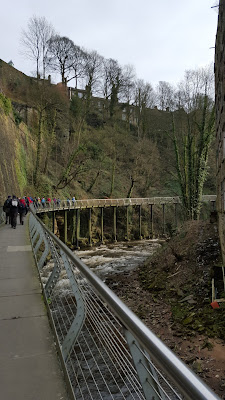I haven't blogged in a very long time, but if anything merits some blog writing, THIS would be it!
The gif below (taken from Monty Python and the Holy Grail) represents the past month better than anything else I've seen:
On 23rd January, when Wuhan, China was placed under quarantine, I was flying from Manchester, UK to Miami, Florida to begin my holiday on The Rock Boat XX cruise. After decades of periodic deadly zoonotic disease outbreaks in China that didn't go very far -- various avian influenzas and SARS -- whatever was happening in January was physically and psychologically a world away from me.
On 1st February, I was flying back to the UK after an amazing music festival at sea with friends and post-Rock Boat recovery chilling out in Key West with Kristin. Global public health emergency? Some new respiratory disease confirmed in a family of Chinese nationals in the UK? Interesting news, but it didn't have anything to do with me, right?
I went down to Birmingham on Saturday, 8th February, to go to the CAMRA Great British Beer Festival Winter with my friend, Matt, and stopped over. We did brunch at Wayland's Yard and hit a few pubs on Sunday. Life was good. That was weekend that the Chinese whistle-blower, Li Wenliang, died. That Sunday, 9th February, the death toll in China surpassed that of the 2002-2003 SARS epidemic.
Honestly, in February, I think everyone in the UK (myself included) was more concerned about the winter storms than anything else. Storm Dennis was TERRIBLE, and there was catastrophic flooding in some areas. It was immediate and in our backyards. I still believed the proven, scientific methods of extensive testing, contact tracing and quarantine would keep this new virus contained.
22nd-23rd February was a weekend in Liverpool with friends for the Liverpool beer festival and pub crawling in the Georgian Quarter. I do remember being slightly concerned that the beer festival might be impacted, but because of the winter storms, not because of any kind of outbreak. It was a great weekend (I love Liverpool so much!) and a lot of fun, but then things got progressively more and more weird.... 29th February I was out in Manchester for Caroline's big birthday party and hanging out with Stacey. But by 1st March, the outbreak in Italy had sunk in, companies were implementing travel restrictions, my employer's Business Continuity Plan was set in motion, community transmission was happening, the first death had happened in the USA, and we had confirmed cases throughout the UK in England, Wales, Northern Ireland and Scotland.
I've lived through an era with the Iran hostage crisis, the attempted assassination of Ronald Reagan, the looming threat of WWIII and nuclear annihilation, Chernobyl, the Challenger Explosion, the fall of the Iron Curtain, the Exxon Valdez, five decades of horrific terrorist attacks, the Oklahoma City bombing, Gulf Wars I and II, Fukushima, September 11th, Deepwater Horizon, too many mass shootings to process, multiple Black Mondays, the Great Recession, SARS, Swine Flu, Ebola, HIV/AIDs, etc. etc. etc. I never would have thought of myself as a "sweet Summer child". I'm Gen X, dammit, which is pretty much the embodiment of a resilient cynic. Yet here I am, with the world gone bat-shit crazy all around us, Winter has come, and all I can think is, "Oh, my sweet Summer child!"
Saturday 7th March was the very last day of normality for me. A colleague was having a birthday celebration in Chester, so I went into the city for his celebration. I thought at the time -- maybe I shouldn't be hugging people, shaking their hands, or talking close face-to-face, but that still felt too anti-social. Humans are inherently social beings -- we touch, we hug, we lean in. It's one of the most wonderful things about us, and it's also what makes us vulnerable.
On 8th March, Italy placed all 60 million residents on lockdown, and on 11th March, the World Health Organisation declared the outbreak a "PANDEMIC". USA's President Trump banned all travel from the 26 European countries. And on 12th March, I quietly went shopping at Tesco Broughton and -- without panicking, without hoarding -- I finished preparing with sufficient, practical supplies, non-perishables and freezer foods to ensure I'd be covered for 2 to 3 weeks, if necessary.
The gif below (taken from Monty Python and the Holy Grail) represents the past month better than anything else I've seen:
On 1st February, I was flying back to the UK after an amazing music festival at sea with friends and post-Rock Boat recovery chilling out in Key West with Kristin. Global public health emergency? Some new respiratory disease confirmed in a family of Chinese nationals in the UK? Interesting news, but it didn't have anything to do with me, right?
I went down to Birmingham on Saturday, 8th February, to go to the CAMRA Great British Beer Festival Winter with my friend, Matt, and stopped over. We did brunch at Wayland's Yard and hit a few pubs on Sunday. Life was good. That was weekend that the Chinese whistle-blower, Li Wenliang, died. That Sunday, 9th February, the death toll in China surpassed that of the 2002-2003 SARS epidemic.
Honestly, in February, I think everyone in the UK (myself included) was more concerned about the winter storms than anything else. Storm Dennis was TERRIBLE, and there was catastrophic flooding in some areas. It was immediate and in our backyards. I still believed the proven, scientific methods of extensive testing, contact tracing and quarantine would keep this new virus contained.
22nd-23rd February was a weekend in Liverpool with friends for the Liverpool beer festival and pub crawling in the Georgian Quarter. I do remember being slightly concerned that the beer festival might be impacted, but because of the winter storms, not because of any kind of outbreak. It was a great weekend (I love Liverpool so much!) and a lot of fun, but then things got progressively more and more weird.... 29th February I was out in Manchester for Caroline's big birthday party and hanging out with Stacey. But by 1st March, the outbreak in Italy had sunk in, companies were implementing travel restrictions, my employer's Business Continuity Plan was set in motion, community transmission was happening, the first death had happened in the USA, and we had confirmed cases throughout the UK in England, Wales, Northern Ireland and Scotland.
I've lived through an era with the Iran hostage crisis, the attempted assassination of Ronald Reagan, the looming threat of WWIII and nuclear annihilation, Chernobyl, the Challenger Explosion, the fall of the Iron Curtain, the Exxon Valdez, five decades of horrific terrorist attacks, the Oklahoma City bombing, Gulf Wars I and II, Fukushima, September 11th, Deepwater Horizon, too many mass shootings to process, multiple Black Mondays, the Great Recession, SARS, Swine Flu, Ebola, HIV/AIDs, etc. etc. etc. I never would have thought of myself as a "sweet Summer child". I'm Gen X, dammit, which is pretty much the embodiment of a resilient cynic. Yet here I am, with the world gone bat-shit crazy all around us, Winter has come, and all I can think is, "Oh, my sweet Summer child!"
Saturday 7th March was the very last day of normality for me. A colleague was having a birthday celebration in Chester, so I went into the city for his celebration. I thought at the time -- maybe I shouldn't be hugging people, shaking their hands, or talking close face-to-face, but that still felt too anti-social. Humans are inherently social beings -- we touch, we hug, we lean in. It's one of the most wonderful things about us, and it's also what makes us vulnerable.
On 8th March, Italy placed all 60 million residents on lockdown, and on 11th March, the World Health Organisation declared the outbreak a "PANDEMIC". USA's President Trump banned all travel from the 26 European countries. And on 12th March, I quietly went shopping at Tesco Broughton and -- without panicking, without hoarding -- I finished preparing with sufficient, practical supplies, non-perishables and freezer foods to ensure I'd be covered for 2 to 3 weeks, if necessary.

























